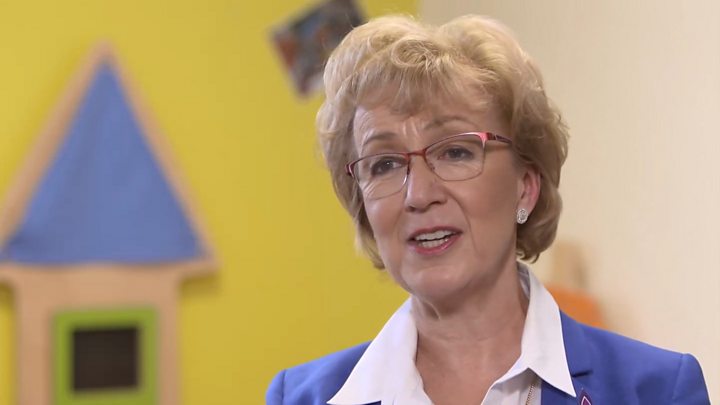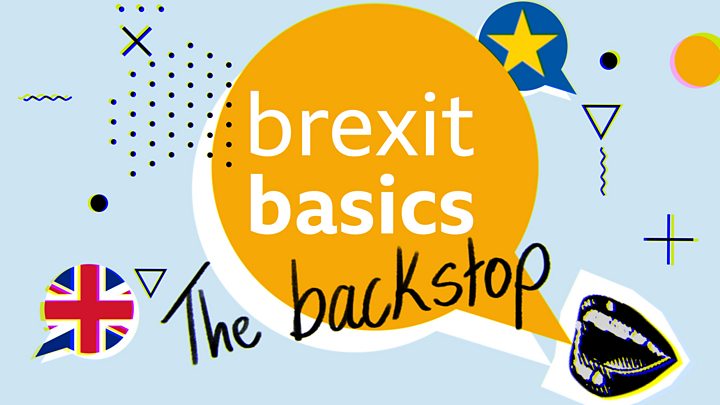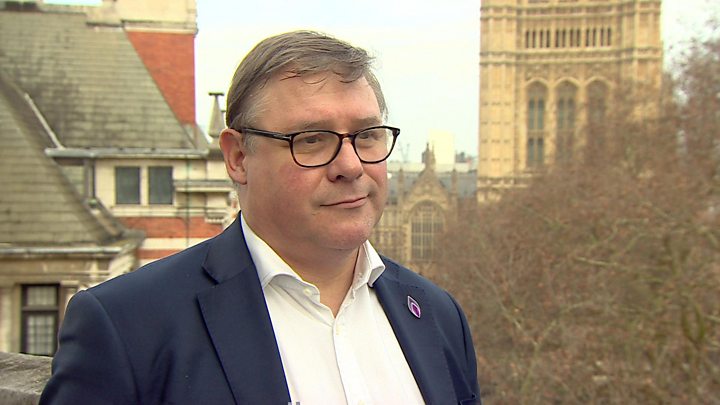Brexit: EU could move on ‘red lines’, says UK chancellor

Media playback is unsupported on your device
The EU could be ready to drop some of its “red lines” from the Brexit deal it struck with the UK to “help” save it, Chancellor Philip Hammond has said.
He did not believe the EU would scrap the backstop plan to keep the border open between Northern Ireland and Ireland.
But some EU leaders were “looking at what they can do” to change it.
Andrea Leadsom has, meanwhile, said the EU would delay Brexit for a “couple of weeks” to help get a deal through.
She told the BBC’s Newsnight that due to our “very strong relationship” with the EU, a short extension would be “feasible”.
But Downing Street said: “There is no change to our position.
“We are not considering an extension to Article 50 and are committed to doing whatever it takes to have the statute books ready for when we leave the EU on 29 March this year.”
The UK is set to leave the EU on that date, with or without a deal.
Theresa May is battling to get her plan through Parliament, despite the fact it suffered an historic defeat in the Commons last week – losing by 432 votes to 202.
A major part of the loss was because of the controversial backstop, which is the fallback position for after Brexit to ensure a hard border is not introduced.
Without a hard border, there will be no checks on people or goods passing between the two countries – as it is now.
Critics claim the backstop plan separates Northern Ireland from the rest of the UK by keeping it more closely aligned to EU rules. But its backers say it will prevent political tensions rising along the border.

Media playback is unsupported on your device
Downing Street said it was continuing conversations with MPs to address a range of concerns about the backstop ahead of the plan returning to the Commons on Tuesday – including with hard-line Brexiteers in the Tory Party and the DUP, which supports the government in Parliament but voted against her deal.
Both sets of MPs have said they will not vote for the PM’s deal while the backstop is part of it.
No 10 admitted they were “not there yet” with a new proposal to take to Brussels, but said there was a clear message from the EU that they wanted the UK to leave with a deal and, in order to do so, there will have to be some changes.
Some backbench MPs are trying to make the deal more palatable by removing, replacing or time-limiting the backstop, while others are trying to force ministers to delay Britain’s departure from the EU for up to a year if MPs can’t agree on a deal by 26 February, to prevent a no-deal Brexit.
Speaking to BBC Radio 4’s Today programme from Davos earlier, Mr Hammond said leaving with a withdrawal agreement was the “only credible and sustainable way” forward and warned of “very significant disruption” for the UK economy if the country left the EU without a deal.
But he claimed some European politicians were “thinking very hard about where the European Union has drawn its red lines [and] whether they really need to be in the place where they have been drawn”.
He added: “What I am hearing from European politicians and commentators is that they do take this issue very seriously, they understand the challenge that we have got at home and generally – not all of them, but many of them – want to help.
“They are not prepared to compromise on the fundamental principles that the EU has set out, but they certainly are looking at whether there is anything they can do without compromising those principles.”
French finance minister Bruno Le Maire said it was up to the British government to find a way out of the situation, not EU member states.
He told Today that the backstop issue was “done” and the EU had “nothing to give” on the Brexit deal apart from “clarifications”.
Mr Hammond said the French had “always been the hardest in this debate” and talking to other European politicians would offer “a more balanced view”.
Will an EU compromise win over MPs?
Image copyright
AFP/Getty Images
By Chris Mason, BBC political correspondent
Speak to people from the government in private, and some will tell you they think minds are moving on their own side.
They hope some Brexiteers are open to compromise; willing to climb down, if only they can be provided with a ladder.
And now the chancellor has said in public that perhaps the EU is willing to budge at least a bit too.
On Tuesday, MPs will get a chance to express their views on a range of possible options, which could, depending on how the day plays out, hand the prime minister numerical evidence that Parliament may be able to support a variation of her Brexit deal – if the EU is willing to compromise too.
Publicly, the EU is saying what it has always said – the withdrawal agreement is finished and it isn’t being re-opened.
So, the big question will be, is anything Parliament could potentially coalesce around and vote through also palatable to the EU?
We are not likely to get any indication of that until at least the middle of next week.
In an interview with BBC’s Newsnight, Mrs Leadsom said she believed the government could still get Mrs May’s deal through Parliament before 29 March.
But, she added: “In spite of everything, we have a very strong relationship with our EU friends and neighbours and I am absolutely certain that if we needed a couple of extra weeks or something then that would be feasible.
“We would want to think carefully about it, but as things stand, I do feel that we can get, with the support of both houses – the House of Commons and the House of Lords – with goodwill and a determination, we can still get the legislation through in time.”
- Read more from the Newsnight interview on Nick Watt’s blog
The deputy leader of the DUP, Nigel Dodds, said he had been “encouraged” by a change in tone from Europe – namely a speech by the EU’s chief negotiator, Michel Barnier, who said on Wednesday that they would “have to find an operational way” of carrying out checks without putting a hard border between Ireland and Northern Ireland.
Mr Dodds called it a “new and more realistic approach” and “a long way from the dramatic language EU spokespeople were using this time last year”.
But Mark Francois, a Tory MP and vice chairman of the pro-Leave European Research Group, said: “The only thing that we would contemplate is if the entire backstop is removed from the [deal].”
“They’d have to take it out lock, stock and barrel. I don’t know whether the EU would be prepared to do that, but if they’re not, then we’re not going to support it.”
On Thursday, the German boss of Airbus, Tom Enders criticised Brexiteer “madness” and said his company might have to make “potentially very harmful decisions for the UK” in the event of it leaving the EU with no deal.
Airbus currently employs 14,000 workers in the UK and every wing on its commercial aircraft is currently made here.
In a video message, Mr Enders said: “Please don’t listen to the Brexiteers’ madness which asserts that ‘because we have huge plants here we will not move and we will always be here’. They are wrong.”
But Mr Francois hit back in a live interview on BBC News, tearing up Mr Enders’ words and saying: “My father, Reginald Francois, was a D-Day veteran. He never submitted to bullying by any German and neither will his son.”

Media playback is unsupported on your device


